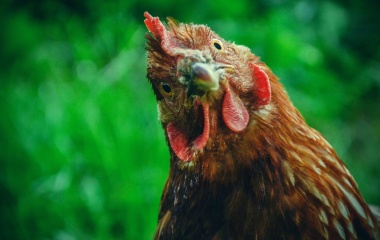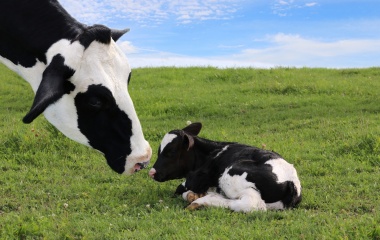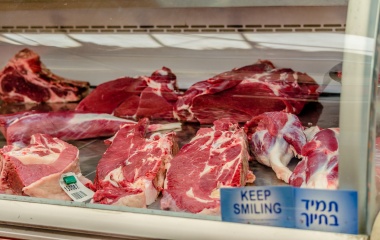
The privileges and obligations of the firstborn are a major theme of Pesach. Most famously, the proximate cause of the Exodus was makat bechorot, the death of the firstborn Egyptians. Pesach gets its name because G-d pasach, passed over, our homes as He smote the Egyptians. It is in appreciation and recognition of being saved from the fate of their Egyptian counterparts that the custom of ta’anit bechorim, the fast of the firstborn, developed[1]. In instructing Moshe in his mission, G-d tells him to tell Pharaoh that, “Israel is My son, My firstborn” (Shemot 4:22).
It is thus most fitting that the Daf Yomi cycle began masechet Bechorot, the tractate that details the laws of the firstborn, on erev Pesach.
It is natural for people to have a special love for the first fruit of their efforts. This is why business owners will keep and often display the money received from their first transaction, hockey players will keep the puck of their first goal (sorry, Maple Leaf fans—maybe next year), and on and on it goes. The Torah thus insists that we dedicate that which is first to G-d. Masechet Bechorot details the laws of three types of firstborn; a male firstborn child of the mother, the firstborn of a “kosher animal”, and a firstborn donkey.
The Mishna begins with the laws of peter chamor, the mitzvah to redeem a firstborn male donkey by giving a sheep to a kohen in its stead. Failing that, one must kill the donkey by slaughtering it from the back of the neck.
What is so special about a donkey that it, amongst all non-kosher animals, is to be redeemed? The Gemara (Chulin 5b) suggests that the Jewish people used donkeys to carry the gold and silver they were given by their former taskmasters as they departed Egypt. In the ancient world, it was donkeys that were the beasts used for burden and transport—with only the very wealthy using camels[2]—and we must acknowledge our debt to the donkey[3].
Perhaps we can find additional meaning to this law based on what we know about donkeys. The first item my internet search turned up regarding the history of the donkey is that “the wealth of the Egyptians was due to the precious metals carried from Africa by donkeys”. In other words, just as we had to slaughter the sheep worshipped as a god in Egypt, the donkey represented the economic success of Egypt. Apparently, the Torah wants us redeem both the sheep and donkey from their Egyptian role and use them in the service of G-d.
The use of a donkey might also have an internal Jewish message. The donkey is known be an extremely stubborn animal. The phrase “stubborn as a mule”—a mule being the offspring of a male donkey and a female horse—is a reference to the stubbornness on the male side. In actual fact, this stubbornness is a sign of their highly developed sense of self-preservation. They will stand and think and not budge as they decide what their next best move is—and unlike other animals, they do not act instinctively. We, the Jews, are stiff-necked people; and perhaps redeeming a donkey is symbolic of using our stubbornness for redemptive purposes only. And it is to be redeemed for a sheep—the most meek and obedient of animals.
The laws relating to a bechor beheimah tehora, a firstborn male of a domesticated animal, take up the bulk of the masechet. After a period of 30 days for a small animal and 50 days for a larger animal, the owner is to give the animal to the kohen, who offers its fats and blood on the altar and eats the meat within two days as per a korban shelamim, peace offering. If the animal develops a mum, a defect, it is slaughtered and can be eaten by all. The details of what qualifies as a mum can be quite complex and in Talmudic times, there was a special semicha given to one who was expert in “yatir bechorot”, knowing when a bechor developed a mum (see Sanhedrin 5a).
In theory, this semicha is relevant even today, as the laws of firstborn animals apply although there is no Temple. Hence, we are not allowed to eat a bechor until a certified expert declares a mum. In practice, however, pregnant animals are sold—either in full or in part—to a non-Jew, exempting the fetuses from the laws of a bechor. (Using a sale mechanism to “avoid” a difficult application of Jewish law is one more link between masechet Bechorot and the holiday of Pesach).
While in practice, the laws of the bechor are dormant today, an important contemporary topic that arises from this discussion is that of professional negligence. Beginning with a mistaken ruling vis-a-vis a bechor but then moving to other areas, the Talmud discusses the liability incurred when a mistaken ruling is given, distinguishing between mistakes by an expert and those of a layman. This leads to a discussion regarding the most relevant topic of payment for religious functionaries. The Mishna (Bechorot 4:5-6) asserts that “one who takes money to examine the firstborn [for defects], we may not slaughter an animal based on his ruling; one who takes a reward to judge, his judgments are null and void; a witness [who takes money to testify], his testimony is null and void”. While today we are allowed and obligated to pay those who devote their time and energy to serving the Jewish people, one must never lose sight of the pernicious impact money can have on one’s judgment.
In chapter 8 the Talmud discusses the laws of pidyon haben, redeeming the firstborn—who were originally destined to serve as our religious leaders—from the actual leaders, the kohanim. The Mishna compares and contrasts pidyon haben to another law applicable to the firstborn, that of a double portion of inheritance. Interestingly, the definition of the firstborn can vary between these two laws even beyond the fact that, regarding pidyon haben, it is the child first born of the mother who is to be redeemed, whereas regarding inheritance, it is the father’s firstborn who gets a double portion.
The last chapter of the masechet discusses the laws of maaser beheimah which, despite not dealing with firstborn animals, is often grouped together with a bechor. This law requires that a farmer separate every tenth kosher animal from his flock and, similar to a bechor, slaughter it on the Temple grounds, offer its fats and sprinkle some of its blood on the altar, and be eaten within two days. However, unlike a bechor, the animal itself is eaten by the owner and shared with anyone and everyone.
The special laws relating to a bechor do not resonate with many today, where we—for good reason—give privileges to those who earn them, and eschew granting them to people based on where and when they happened to be born. The Torah itself seems to share this ambivalence. One of the major themes of sefer Breisheet is how ultimately, the order of birth is of little significance. Beginning with Cain and Hevel and continuing with Shem and his brothers—through Yishmael and Yitzchak, Eisav and Yaakov, Yosef and his brothers, and Ephraim and Menashe—it is the younger brother who rises above the older and becomes the heir to the way of G-d. And while our rabbis want to equate Moshe and Aharon, it is Moshe who became the conduit between G-d and Israel.
Yet we would be foolish to think the luck of birth is of no significance. And the Torah’s expectations are, at least to a limited extent, based on little else but how we came into being. The entire reason the vast majority of us are Jewish is none other than to whom we were born. But the significance of our birth order is a practical one, not a moral one. And as G-d told Moshe regarding the Jewish people, one can be a bechor even if one is not the firstborn.
We are all born with certain talents and challenges. Ultimately what matters is what we make of our lives and the choices we make during our lifetime.
[1] How, why and when this fast was “replaced’ with the custom of bechorim making (or more commonly, attending) a siyum of learning is not fully clear. But such a transformation reflects the notion that G-d’s charge to Moshe was to demand that Pharaoh let the people go so that they could worship G-d, an idea most appropriately reflected in a siyum.
[2] The repeated use of the camel by our patriarchs just attests to the great wealth they had—something the Bible itself deems worthy of note. Rashi (Breisheet 37:25), quoting the Midrash, notes that the Torah specifically mentions that the Yishmaelites who transported Yosef to Egypt had sweet-smelling spices on the caravan “to inform us of the merit of the righteous”. Rashi does not note that this merit would also have included the fact that he was brought down via the camel.
[3] And despite the suffering inflicted upon us, we must acknowledge our great debt to the Egyptians—it was in Egypt that we were formed as a nation. Our last memory of Egypt is of the gifts showered upon us by the people, whom we are—if they so desire—to welcome into our midst (Devarim 23:8-9).



